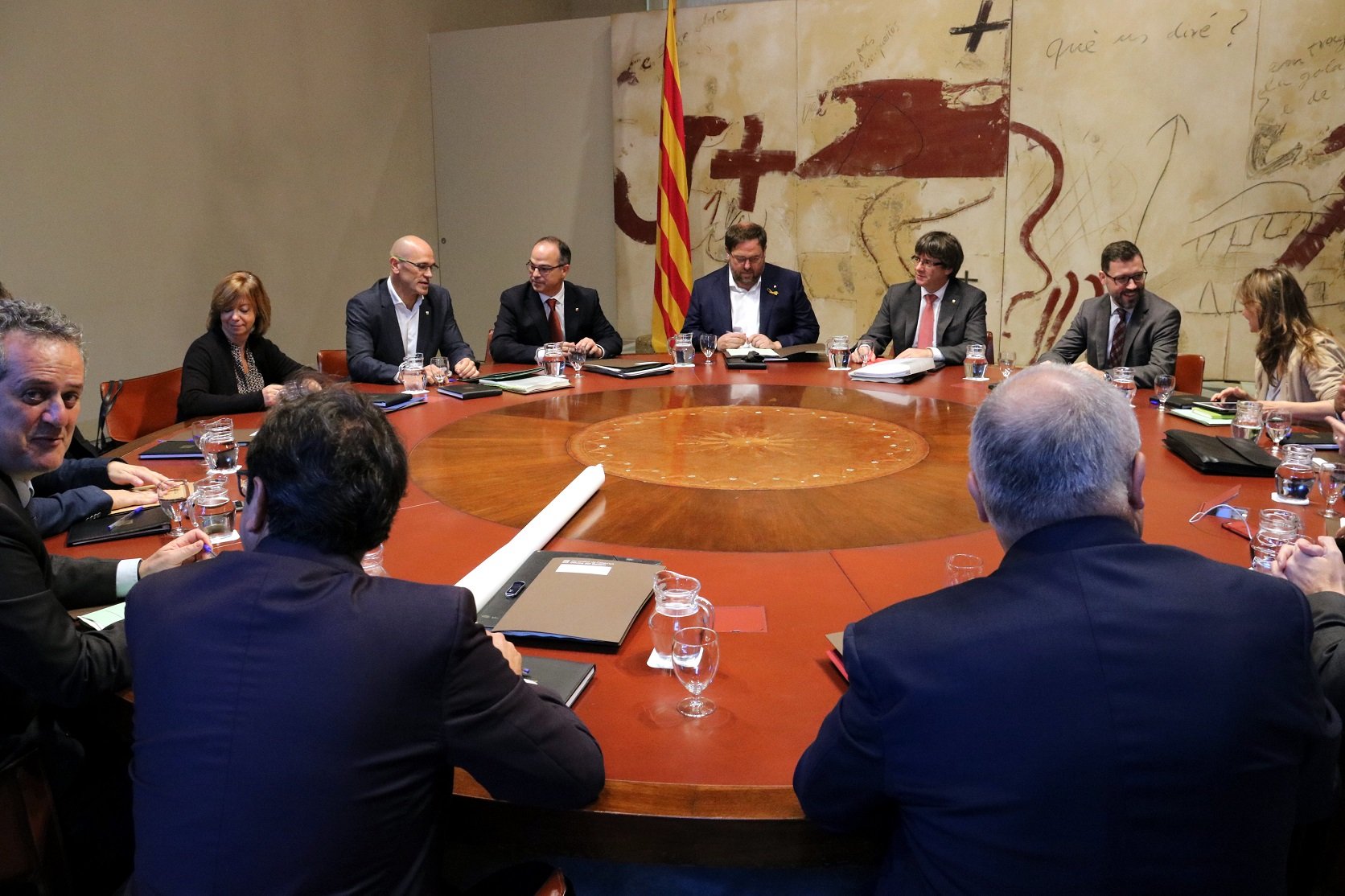Negotiations between JuntsxCat and ERC, after a long week of all manner of speculation, are starting to (slowly) point to specific steps. A proposed resolution in defence of the institutions of Catalonia and in recognition of president Carles Puigdemont which would have to be registered shortly in the Parliament is to serve as trigger for a process whose next step would be a presidential investiture debate. Once this debate confirms, as everything seems to suggest, that it would be impossible to invest Puigdemont, JuntsxCat will give way to another candidate, which could be their number two, Jordi Sànchez, or minister Jordi Turull, although some reports name Elsa Artadi. This is all part of "comprehensive" negotiations in which the composition and structure of the new government are also key elements.
As El Nacional reported yesterday, in the afternoon JuntsxCat had delivered their resolution proposal to ERC and sources with knowledge of the negotiations say that it could be finalised this Friday. The plan was to discuss the statement today, but in the end the meetings were suspended. The statement is to cover events around the 1st October referendum and the results of the 21st December election as well as to denounce the Spanish state's repression and the fact that, despite the election results, the candidate with the support of the majority of the chamber, Puigdemont, cannot be invested.
The next issue is to define the government's agenda and the constituent process for the Republic, which already formed part of conversations with the CUP, deciding the model for the country following a public debate. Much more difficult appears to be the agreement about the structure of the government.
JuntsxCat and ERC had already a government split 50-50 between them, an increase for ERC compared to the previous executive. The presidency would fall to Puigdemont's candidacy, JuntsxCat. It's taken as certain that Turull, if he doesn't become president, will remain as minister for the Presidency. JuntsxCat also expect Elsa Artadi to assume a key role in the new executive. It remains to be seen what Puigdemont's role will end up being. The option has still not been ruled out of carrying out an institutional act of restoration in Brussels which, for JuntsxCat, doesn't have to be limited to a symbolic recognition, but could carry political weight.
ERC will have the vice-presidency. Puigdemont's circles, as part of their wish to restore members of the previous executive, argues for keeping Oriol Junqueras in the role. The decision, however, would fall to ERC themselves, who have to take into account the key role played by a vice-president and the difficulty involved in managing the department from prison.
If Marta Rovira opts to stay in her role as the party's secretary general and decides against joining the government, the name of the Economy secretary, Pere Aragonès, stands out. Aragonès has a good relationship with JuntsxCat and has assumed a leading role in the negotiations. Another of the names to appear, interestingly, is an independent, coordinator of the National Pact for the Referendum, Joan Ignasi Elena, one of the figures with the greatest ability to create consensus within pro-independence ranks after managing to maintain the wide agreement on the Pact, including Ada Colau's Comuns.
As part of the conversations around the vice-presidency, ERC has put on the table the question of the government spokesperson. In the last government, the spokesperson role was held by the minister of the Presidency, namely Jordi Turull, and JuntsxCat want to hold on to the responsibility, but ERC have also put a claim on it.
As for the rest of the cabinet, they want everyone who is able to and wants to to return. That would include Turull and the minister of Territory and Sustainability, Josep Rull. Also to continue would be Foreign minister, Raül Romeva, although he would have to adapt the role as the judge has withdrawn his passport, as has happened to all the members of the government facing legal proceedings. JuntsxCat, however, want to take over the briefing, which could go to one of the members of the executive currently in exile.
On the other hand, Carles Mundó, Meritxell Borràs and Joaquim Forn (the only minister still in prison) have said they won't be ministers again. Dolors Bassa, meanwhile, has gone back to working as a teacher, and Meritxell Serret, Lluís Puig, Clara Ponsatí and Toni Comín are in exile, so, if they want to continue in the government, would have to assume their powers from Brussels, or limit themselves to a representative role.
All this means that new faces will have to be brought in as substitutes and to take on the planned new portfolios, like the one from the splitting of the ministry of Well-being and Labour. The only member to remain in his position after article 155 was the secretary, Víctor Cullell, not affected by the central government's suspension.
JuntsxCat doesn't intend to bring in more names from PDeCAT to the government, despite rumours suggesting the possibility that Congress deputy Ferran Bel might be making a move after resigning yesterday as mayor of Tortosa. On the other hand, the names of a number of the members of Puigdemont's parliamentary group, like Laura Borràs, have already come up in the last few government reshuffles and will probably be back on the table this time.
All of this, however, is hanging on an agreement which, currently, is coming along very slowly, and whose first objective is to agree on a resolution and set a plenary session to approve it.

